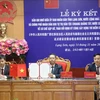The rising demand of foreign direct investment enterprises for raw materials has given local companies the chance to become suppliers, but they must be more active in the race.
According to the Vietnam Association of Foreign-Invested Enterprises, Samsung Vietnam, the electronic giant from the Republic of Korea with an approximately 6.8 billion USD investment in the country, was expected to meet with around 100 Vietnamese companies next week to work on raw material supplies, after having recently got approval to develop a 1 billion USD plant in the Samsung Bac Ninh Hi-Tech Complex.
The association's vice president Nguyen Van Toan said to Dau Tu (Investment) newspaper that Samsung Vietnam would place their demands and requirements for local companies wishing to become its suppliers.
He said that Samsung would also provide support to Vietnamese companies in meeting the standards set by FDI enterprises and engaging in the supply chain.
If successful, local companies would benefit a lot from becoming a link in Samsung's value chain, Toan said.
Contributing 23.9 billion USD to Vietnam's total exports, which accounted for 18 percent of its total exports, the Korean phone producer's active move in increasing the local procurement rate would give a boost to the development of the support industry and Vietnamese small and medium-sized enterprises. The current local procurement of Samsung was 30 percent.
However, amid the rising FDI inflow in the support industry, whether local companies could grab the opportunity to become raw material suppliers remained a difficult question.
In the garment and textile industry, for example, Vietnam witnessed a rising wave of foreign investment ahead of the Trans-Pacific Partnership Agreement even as local companies were still confused by a series of standards, Tran Huu Huynh, from the Vietnam Chamber of Commerce and Industry was quoted as saying, by the newspaper.
According to the Japan External Trade Organisation survey in March, the localisation rate of Japanese enterprises in Vietnam was 32.2 percent in 2013, up 4.3 percentage points over the previous year.
However, the rate was low compared to 64 percent in China, 53 in Thailand, 42 in Malaysia and 41 in Indonesia.-VNA
According to the Vietnam Association of Foreign-Invested Enterprises, Samsung Vietnam, the electronic giant from the Republic of Korea with an approximately 6.8 billion USD investment in the country, was expected to meet with around 100 Vietnamese companies next week to work on raw material supplies, after having recently got approval to develop a 1 billion USD plant in the Samsung Bac Ninh Hi-Tech Complex.
The association's vice president Nguyen Van Toan said to Dau Tu (Investment) newspaper that Samsung Vietnam would place their demands and requirements for local companies wishing to become its suppliers.
He said that Samsung would also provide support to Vietnamese companies in meeting the standards set by FDI enterprises and engaging in the supply chain.
If successful, local companies would benefit a lot from becoming a link in Samsung's value chain, Toan said.
Contributing 23.9 billion USD to Vietnam's total exports, which accounted for 18 percent of its total exports, the Korean phone producer's active move in increasing the local procurement rate would give a boost to the development of the support industry and Vietnamese small and medium-sized enterprises. The current local procurement of Samsung was 30 percent.
However, amid the rising FDI inflow in the support industry, whether local companies could grab the opportunity to become raw material suppliers remained a difficult question.
In the garment and textile industry, for example, Vietnam witnessed a rising wave of foreign investment ahead of the Trans-Pacific Partnership Agreement even as local companies were still confused by a series of standards, Tran Huu Huynh, from the Vietnam Chamber of Commerce and Industry was quoted as saying, by the newspaper.
According to the Japan External Trade Organisation survey in March, the localisation rate of Japanese enterprises in Vietnam was 32.2 percent in 2013, up 4.3 percentage points over the previous year.
However, the rate was low compared to 64 percent in China, 53 in Thailand, 42 in Malaysia and 41 in Indonesia.-VNA



















